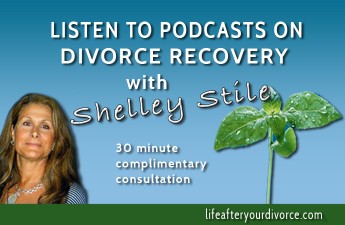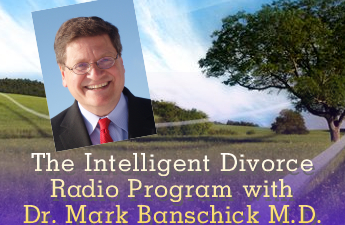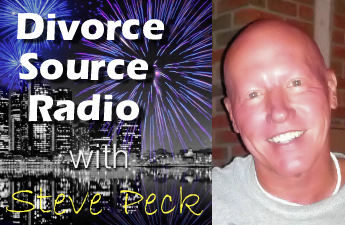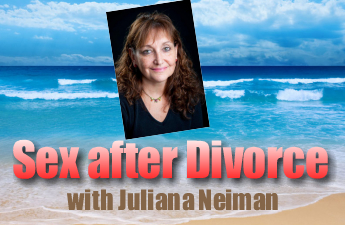Archive for The Intelligent Divorce
Learning Disabilities - Is School Helping or Hurting Children?
Posted by: | CommentsIn this episode of The Intelligent Divorce with Mark Banschick, M.D., we discuss learning disabilities in children and help identify signs that a child may be in trouble. If you suspect your child is having difficulty in school due to the stress of divorce or a learning disability, it’s important to get them tested and identify the problem as soon as possible.
Getting your child into a set routine is a great way to balance their life. Good sleeping, eating, and study habits are critical to your child’s well-being, and Dr. Banschick provides an example of what this looks like.
We also identify common learning disabilities and provide options for treatment, including prescribed medication. 5% of children in school today are dealing with ADHD. If you suspect that your child may be exhibiting signs of ADD, ADHD, or a learning disability, know that you’re not alone-evaluation and help are available. Be proactive in getting help for your child.
Topics in the program include:
- Setting a routine for your child
- How to create an environment conducive to study at home
- Working with teachers to identify and support your child’s needs
- The different types of learning disabilities
- Defining ADD and available treatment options
- How ADD affects kids in school
- ADD kids are at a higher risk for drug and alcohol abuse
- The hyperactive child
- And much more.
Podcast: Play in new window | Download
Is it Appropriate to Medicate Due to The Anxiety and Depression of Divorce?
Posted by: | CommentsUnder guidance from a health professional, medication can relieve some of the symptoms of anxiety, but it requires non-drug treatments to produce lasting changes and continuing relief from anxiety. Medication doesn’t cure the underlying problem and is usually not a long-term solution. Anxiety medications also come with side effects and safety concerns, including the risk of addiction.
In this episode of The Intelligent Divorce, Mark Banschick, M.D., discusses when drug therapy is deemed appropriate, but also offers healthy alternatives such as meditation, exercise and a healthy diet. Many are surprised to learn that some natural alternatives may work as well as medication. Dr. Banschick believes each patient is unique, and therefore, what suits one patient may not work for another. This program provides options so that you can make a more informed decision regarding your mental and physical health.
Podcast: Play in new window | Download
Understanding Parental Alienation
Posted by: | CommentsIn this episode of The Intelligent Divorce with Mark Banschick M.D., we explore Parental Alienation with clinical and forensic psychologist, Dr. Abe Worenklien.
Parental alienation is a social dynamic, generally occurring due to divorce or separation, when a child expresses unjustified hatred or unreasonably strong dislike of one parent, making access by the rejected parent difficult or impossible. These feelings may be influenced by negative comments by the other parent and by the characteristics, such as lack of empathy and warmth, of the rejected parent.
Many people learned of parental alienation when a voice-mail of actor, Alec Baldwin, was leaked to the press by his former wife. To the uninformed ear, Alec sounded overly harsh in a message he left to his ten-year old daughter. Alec, apologetic for his harsh words, explains his behavior as a result of the growing frustration of being a “targeted” parent in his book A Promise to Ourselves: A Journey Through Fatherhood and Divorce. (This book is available in our bookstore under the “Recommended Reading” tab).
This is a “must hear” program for any parent going through divorce and Dr. Worenkien provides insight of why a seemingly “normal” parent might attempt to drive their child away from their biological mother or father during or after divorce.
Podcast: Play in new window | Download
Does My Teen Need Treatment?
Posted by: | CommentsIn this episode of The Intelligent Divorce with Mark Banschick M.D., we discuss how to tell the difference between an upset teen and a teen that needs treatment, and perhaps medication.
Teenagers are rarely easy. Normal adolescents, bless their hearts, can be moody, demanding, self centered and otherwise preoccupied at the expense of their studies or the family. When things go wrong, it can be rocky going. Depression, eating disorders, oppositional behavior and drug use are just some of the quagmires lying in the way of healthy adolescent development. Treatment can be a Godsend; even medications when appropriate can help many of the problems that teens may face.
So, do we just run to medicate an adolescent when he or she starts to show symptoms during a divorce? The side effects of medications are real, but not doing any treatment may lead to far worse.
The teenage brain is a developing organ that won’t reach maturity until twenty-five or so, and the psychological roller coaster of emerging independence and sexuality can be daunting for girls and boys alike. Add a divorce (or any real stress), and figuring out what’s going on psychologically can be tricky. While your adolescent may be inherently inconsistent, moody, or test limits, during a divorce there are additional pressures to deal with over which he has little control - like the dissolution of the family as he knows it, perhaps warring parents or just worries about what the future may hold.
Podcast: Play in new window | Download
Narcissistic Personality Disorder during Divorce
Posted by: | CommentsOn this episode of The Intelligent Divorce, Dr. Banschick and Steve Peck speak with Dr. Andrew Klafter, director of psychotherapy training at the University of Cincinnati Residency Training Program.
Dr. Klafter has dedicated much of his research to learning more about Narcissistic Personality Disorder (NPD). Narcissistic personality disorder is a condition in which people have an inflated sense of self-importance and an extreme preoccupation with themselves.
Before someone might be classified as being narcissistic, it is important to keep in mind that, like every psychological disorder, narcissistic personality disorder too comes in various degrees. Going to the extreme, we might argue that each of us has somewhere a narcissist in her/himself. It even could be said that a narcissistic tendency is important for survival.
However, in the same context it must be emphasized that, while a narcissistic tendency is constructive, a fully elaborated or developed symptomatic of NPD is nothing but destructive. So how do you know if your spouse or even you is a narcissist and what can you do if this is the case?
In this program, we identify what a NPD is and discuss living with and divorcing a narcissist. This is not an easy situation to deal with and turns many divorces into a “high conflict” situation requiring special attention. Dr. Klafter believes a true narcissist can be turned around through therapy and go on to have fulfilling relationships as long as they understand that they have a problem.
Podcast: Play in new window | Download
Divorce at the Movies
Posted by: | CommentsIn this episode of The Intelligent Divorce, Mark Banschick, M.D. takes a look at divorce and family adversity in the movies.
Dr. Banschick believes there are powerful messages in movies that relate to divorce and single parenting that provide wisdom and insight to what might be going on in our lives.
Many children’s movies have situations with divorced parents, the death of a parent, or being raised by extended family . Going to one of these well-done movies with your children provides a great opportunity for dialog afterwards and can be a great way of helping your children better understand divorce. Dr. Banschick tells the tale of The Wizard of Oz like you have never heard it before and provides other examples from ET and The Lion King.
For more movie recommendations for your children as well as yourself, pick up a copy of Dr. Banschick’s Intelligent Divorce book, “Because Your Kids Come First,” available in the Recommended Reading section of www.DivorceSourceRadio.com.
Podcast: Play in new window | Download
How Children Get Wounded During Divorce
Posted by: | CommentsIn this powerful episode of The Intelligent Divorce with Mark Banshick, M.D., we discuss how children can become wounded during a divorce. Our guest is Ditta M. Oliker, Ph.D., author of Hide & Seek: Reclaiming Childhood’s Lost Potential.
After the personal tragedy of losing one of her sons, Ditta began to develop her ideas about psychological survival and the lasting effects of the experiences and hidden messages of childhood. She continued to develop these themes after beginning her practice and incorporated them into her concept of survival systems.
Ditta draws a parallel between the death of a loved one to divorce, which is the death of a marriage and the death of a family as it existed, and explains why how we deal with the loss makes a huge difference for all involved, especially the children.
In the program we learn:
- How children become wounded during divorce and how the wounds can carry over into their adult relationships
- How some children take on the role of caretaker to a parent or sibling and how harmful that can be
- How children adapt to the demands of their situation
- And you’ll hear the original version of the fairy tale, Snow White, and see how it captures the conflict of childhood.
Podcast: Play in new window | Download
Dealing with The Stress of Divorce
Posted by: | CommentsIn this episode of The Intelligent Divorce with Mark Banschick, M.D., we discuss dealing with stress during divorce and our guest is Joanie Winberg of www.FreshStartAfterDivorce.com.
During your divorce, have you ever felt “Stuck in the muck” and not sure how to move your life forward or the stress of your “inner voice” working overtime with doubt or the feeling of lack of self-confidence to make decisions? If so, you’re not alone. Joanie helps us understand how to deal with and gain control over the stress and anxiety we may be feeling during this very difficult time in our lives.
Topics in the program include:
- Learn how much of our stress is self inflicted
- How to quiet our anxious mind
- The difference between internal and external stress
- The difference between real and imaginary stress
- Stress reduction techniques
- And much more.
Podcast: Play in new window | Download
When Divorce Seems Unfair
Posted by: | CommentsIn this episode of The Intelligent Divorce with Dr. Mark Banschick, M.D., our topic is Fairness.
Many of us going through a divorce have felt we have been wronged and that much of what we are going through is unfair. We had hopes and dreams that our marriage would last forever and then one day, perhaps out of the blue, our partner tells us they want out of the marriage, you’re served divorce papers or you discover your spouse has been having an affair. Even the court system fails us in their attempt of fairness.
This can leave us feeling so betrayed and it all feels so unfair. As parents, we have a duty to teach our children about fairness. The only fair outcome of your divorce would be to free yourself from what you believe was not fair and move on to a happier life, and in the process, provide an example to your children that there’s a better life out there with acceptance.
This program also features a powerful example of forgiveness from the biblical story of Job. This is a MUST HEAR PROGRAM for any listener who feels that their divorce wasn’t fair
Podcast: Play in new window | Download
Getting Your Kids to Sleep
Posted by: | CommentsIn this episode of The Intelligent Divorce with Mark Banschick, M.D., our topic is Getting Your Kids to Sleep. This can be a challenging task with many children but during a divorce, the challenge can be even greater.
Our guest is Maureen Healy, founder of Growing Happy Kids, a worldwide organization focused upon fostering happiness in children. She was named a “Creative Activist” by Creative Visions Foundation and authored a “Peace Curriculum” for preschoolers, which is distributed worldwide by The Simha Foundation.
Healy is not new to making a positive impact on children around the world. In 2007, she created a program for Tibetan refugee children in Asia and built child-centered programs around the United States.
Maureen helps parents understand what keeps children up and provides examples of what we can do to provide a better sleep environment that encourages rest and sleep. If you are experiencing problems getting your kids to sleep, this is the program for you!
For more on Maureen, visit: www.GrowingHappyKids.com.
Podcast: Play in new window | Download




















